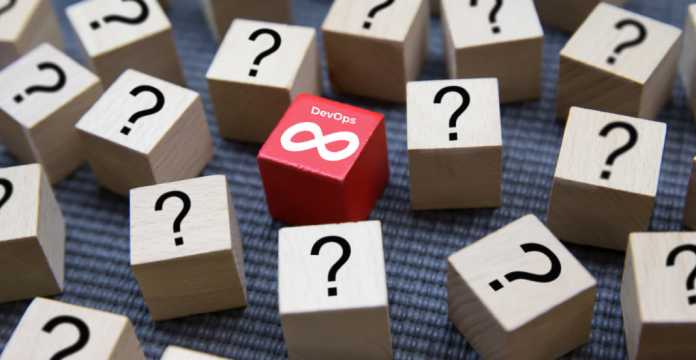
Are you looking for a DevOps-related job and organizational position in the IT enterprise? DevOps is the most trending technology and has massive success worldwide, and as per Forrester’s report, higher than 50 percent of companies are adopting DevOps. The job prospects in the sector are growing, and big payouts for DevOps specialists. The standard yearly salary of DevOps specialists varies around $136,300. So, how ready are you to answer all the DevOps Interview Questions?
Trying to crack the DevOps interview, nevertheless, is not easy and requires much planning. To help you out, we’ve gathered the best DevOps Interview Questions and Answers produced by industry leaders. They will certainly help you to ace your DevOps interview.
DevOps Interview Questions
If you’ve started preparing for development and operations (DevOps) careers in the IT sector, you know it’s a difficult field to break into. To help you prepare for DevOps opportunities in the business, here are some of the most popular DevOps interview questions and answers.
Q1. What Do You Know about DevOps?
Your response needs to be clear and understandable. First, describe DevOps’ increasing significance in the IT industry. Discuss how such a strategy helps to synergize the production and operations teams’ strategies to maximize digital product distribution with a low failure rate. Talk about how DevOps is a value-added process where architecture and operation engineers collaborate during the product or service’s lifecycle, right from the design phase to the implementation phase.
Q2. Indicate What Are the Main Factors or Theories Underlying DevOps.
The main elements or theories underlying DevOps are:
- Code: Infrastructure
- Continuous operation
- Automation
- Monitoring
- Security
Q3. Explain Continuous Integration
Continuous integration is an increasingly critical aspect of the Agile process. Developers usually function during a sprint on functionality or user experiences and contribute their version control repository changes.
If the code has been committed, then the developers’ entire work is well organized, and the build is done on a routine basis depending on each check-in or schedule. Continuous integration thus requires the creator to merge their improvements with the others, to receive early feedback.
Q4. Describe How “Infrastructure Code” Is Processed or Completed in AWS.
In AWS,
- The Infrastructure Code will be in JSON format
- This JSON code is stored in files called templates
- These templates can be deployed and then handled as stacks on AWS DevOps
- The CloudFormation provider will then do the stack process Forming, removing, upgrading, etc.
Q5. Explain the Important Actions of DevOps for Application Improvement and Foundation.
The critical DevOps operations are described below for application creation and infrastructure. Production of the framework has the following fundamental operations:
- Code development
- Code coverage
- Unit trial
- Packaging
- Deployment
Infrastructure holds the subsequent essential operations:
- Provisioning
- Configuration
- Orchestration
- Deployment
Q6. Explain Continuous Delivery in Your Own Terms
Continuous Delivery is an application of Continuous Development that aims to bring the developers’ functionality to the end-users as quickly as possible. During this process, it goes through different stages of QA, Planning, etc., and then into the Manufacturing system for distribution.
Q7. What Are the Different Phases in DevOps?
The various aspects of the DevOps lifecycle are as the following:
- Plan– Originally, a schedule should be drawn up for the form of application to be created. It is still a smart thing to get a clear view of the production process.
- Code-The program is configured according to the needs of the end-user.
- Construct– Build the program by combining different codes developed in the preceding phases.
- Test-This is the most critical step in the creation of an application. Check the document, and if necessary, restore it.
- Integrate– Several codes are built into one by various programmers.
- Deploy– Technology is being distributed for further use in a cloud environment. It is assumed that the new developments will not impact the operation of a website with heavy traffic.
- Operate– Where necessary, operations are conducted on the file.
- Monitor– It tracks the performance of programs. Changes are made to meet the demands of the end-user.
Q8. Name a Few Cloud Platforms Which Are Used to Deploy DevOps.
The popular cloud infrastructure framework used for integrating DevOps is:
- Google Cloud
- Amazon Web Services
- Microsoft Azure
Q9. What is Docker?
Another most frequently asked DevOps Interview Question is about Docker and related topics. It is a containerization technique that collects all the technologies in the form of vessels for the efficient processing of applications.
Q10. What Is the Distinction Between Continuous Delivery and Continuous Deployment?
There are several applications or user stories that are created, tested, and ready for implementation in an Agile Sprint, For Instance. But not everyone will be implemented depending on the client’s requirements and goals. But it’s essential to keep the code readily accessible for distribution here in continuous Delivery.
In Continuous Deployment, all the improvements made by the developer go through different stages to be delivered in an automated fashion into the PRODUCTION circumstances.
Q11. Explain the DevOps Toolchain.
A pile of tools connects to build a DevOps toolchain, automating activities such as creating and distributing the software. DevOps can be done manually with easy steps. With the rise in its complexity, the need for automation grows exponentially, and automation of the toolchain is necessary for continuous Delivery. A Version Management System GitHub is the central feature of a DevOps toolchain.
Q12. What Is the Purpose of Configuration Management in DevOps?
Configuration management enables the control and alteration of various structures. It Standardizes arrangements of services, which in turn control the IT infrastructure. It assists with various server maintenance and management and preserves the integrity of the whole system.
Q13. Is DevOps the Part of Agile Methodology?
Yes, DevOps is part of agile methodology, with the main difference being that it can only be applied over the section on growth. Agile will, at the same time, be used for both processes and improvements.
Q14. Discuss What Is Configuration Management and Mention a Few Popular Tools Used.
Configuration management refers to activities and the different methods used in automating the distribution processes and facilities. It is all about having the server prepared for device deployment (Instance Downloading Device Packages, Network Configuration Settings) until the platform is developed.
Thus, by supplying the programs, the Ops or the system administrator must maintain consistency in multiple environments (Dev, QA, PROD, etc.)
Tools Used in this area to automate the configuration, as mentioned above, management activities are Chef / Puppet / Ansible.
Q15. Describe the Title ‘Canary Release’.
A canary release is a trend that minimizes the possibility of implementing a new software update into the development process. It is achieved by making it visible to a subset of the customer in a managed manner. Until making it open to the entire range of consumers.
Q16. What Role Does Aws Play in DevOps?
Most often you will come across this DevOps Interview Question in your interviews. In DevOps, AWS has the following role:
- Flexible technology– Offers ready-to-use, customizable facilities without the need for program development or configuration.
- Constructed for scale– Using AWS systems, you can handle a single instance or scale to thousands.
- Automation– AWS lets you simplify activities and procedures, allowing you to create further
- Safe– You can configure user permissions and policies using the AWS Identity and Access Control (IAM).
- Large partner ecosystem– AWS supports a broad partner ecosystem that incorporates and expands AWS services.
Q17. Name Some Most Excellent Practices Which Should Be Ensured to Benefit from DevOps.
Here are the best practices for applying DevOps are essential:
- Delivery pace means the time required to get them into the manufacturing process for any job.
- Track how many faults are contained in the different
- In case of a malfunction in the manufacturing process, it is necessary to calculate the real or the average time it takes to recover.
- The number of errors the user is discovering often impacts the application’s consistency.
Q18. Define Jenkinsfile.
Jenkinsfile includes a Jenkins pipeline description, which is reviewed in the Source Control Repository.
- Jenkinsfile is a file with a letter.
- It allows for code analysis and pipeline optimization.
- It provides for the pipeline to take an audit trail.
- The channel has a common source of facts that can be interpreted and edited.
Q19. Describe Version Control System (VCS).
Version control systems, are a sort of technical tool that tracks the implementation updates and merges those updates with the current code. While the developer often makes improvements to the legend, these kinds of devices are useful in seamlessly implementing the new implementation without disrupting other team members’ performance. It will validate the new code and integration so that it can eliminate the code that leads to bugs.
Q20. Name Some Vital Network Monitoring Tools.
Some most notable network monitoring devices are as follows:
- Splunk
- Icinga 2
- Wireshark
- Nagios
- OpenNMS
Q21. Why Are SSL Certificates Accepted in Chef?
The Chef client and the server use SSL certificates to ensure that each node has access to the appropriate data.
-nodes have a combination of secret and public keys. The public key is kept in the folder Chef.
When submitting an SSL certificate to the database, it will hold the node’s secret key.
The server contrasts this against the key to define the node and grant the node access to the necessary data.
Q22. Explain Pair Programming Concerning DevOps.
Pair programming is an Extreme Programming Principles Architecture technique. Two programmers function on the very same device in this form, on the same layout/algorithm/code.
One programmer acts as a “horse,” and another acts as an “observer” who always watches a project’s development to detect issues. With no intimation, the functions can be switched at any time.
Q23. What Is a Branching Procedure in DevOps?
Branching is a method that is used to separate JavaScript. Put it allows a clone of the source system to build two independently created copies. There are different forms of branching. Based on the domain specifications, the DevOps team should then make a decision. This alternative is called strategic branching.
Q24. Explain the Architecture of Docker.
Docker provides an interface for client-servers. Docker Client is a command-run tool. The command is converted using the REST API and sent to the (server) Docker Daemon.
Docker Daemon acknowledges the request to create Docker images and run Docker containers and interfaces with the web browser. A Docker picture is a configuration file, which is used to construct containers.
Q25. What Are Your Expectations from a Career Perspective of DevOps?
To be active in the end-to-end implementation process and the most critical part of helping strengthen the process so that the production and operations departments can work together to appreciate the point of view.
Conclusion
There you go, these are some of the most popular DevOps Interview questions you may face when having an interview. As a DevOps Engineer, it is necessary to possess in-depth knowledge of procedures, software, and related technologies. These DevOps interview questions can help you gain some information about some of the other aspects. To further improve your knowledge about DevOps and to ace any interview, you should consider pursuing a certification course at Invensis Learning.
Some of the popular DevOps Certification Courses are:














